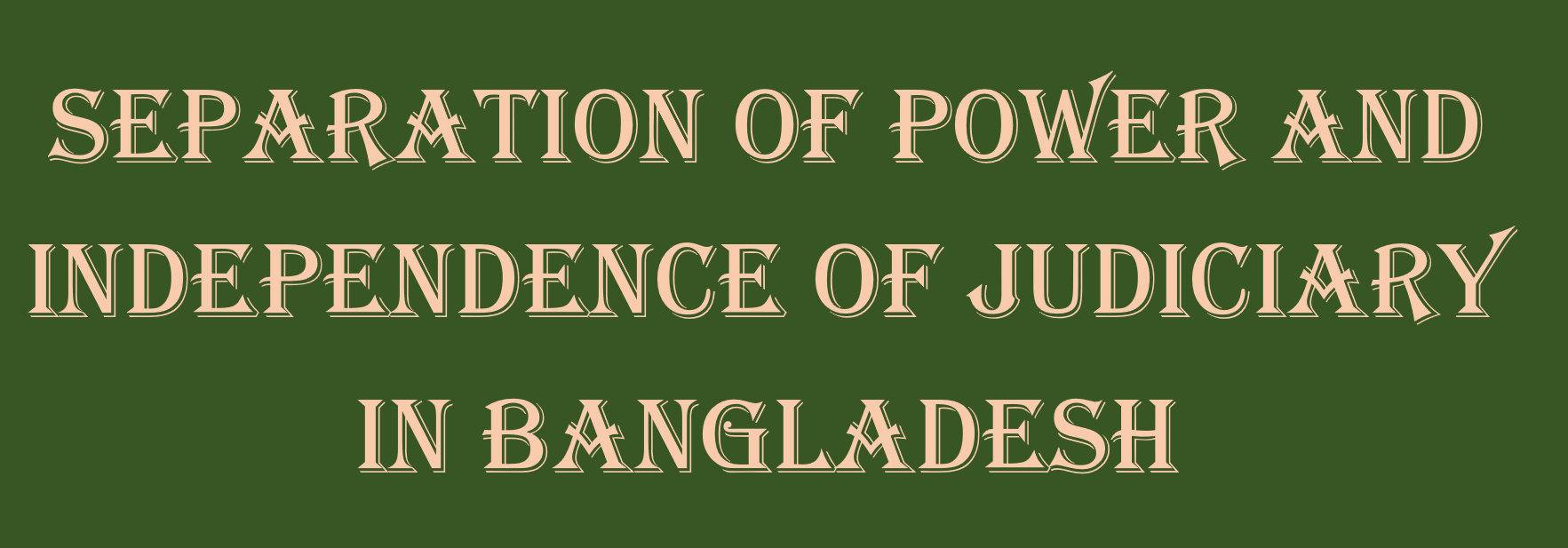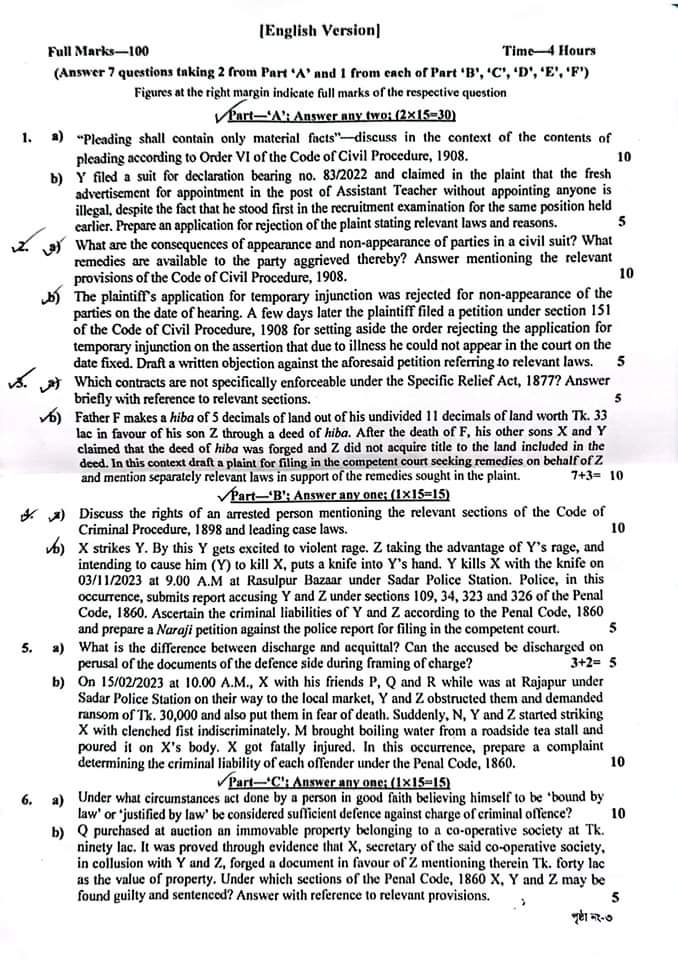Separation of Power and Independence of Judiciary in Bangladesh
Separation of Power:
Montesquieu stated:
"In every government there are three sorts of power: the legislative; the executive in respect to things dependent on the law of nations; and the executive in regard to matters that depend on the civil law.”
The separation of powers can be understood as a constitutional doctrine that separates government into different institutions which are responsible for performing distinct functions. The doctrine requires the separation of government into legislative, executive, and judicial branches. According to this theory of constitutional law, the legislative body will be entrusted to create laws, the executive authority will enforce laws, and the judiciary will be empowered to interpret laws. However, theoretically each branch is required to perform only its own function independently and one branch should not go beyond the boundary of other branch. This theory is typically based on a system of checks and balances.
Cornell Law School defines ‘separation of power’ in the following words:
“Separation of powers is a doctrine of constitutional law under which the three branches of government (executive, legislative, and judicial) are kept separate. This is also known as the system of checks and balances, because each branch is given certain powers so as to check and balance the other branches.”
Modern doctrine of separation of powers is usually traced back to the intellectual contributions Baron de Montesquieu (1689–1755) and his seminal work The Spirit of the Laws (1752). Montesquieu examined the English political system and drew up argue that a state should be divided into branches to perform the functions of government.
Following features of Separation of Power are outlined by Montesquieu:
- The government should be entrusted to three
organs i.e., the executive, the legislature & the judiciary)
- Each organ should be entrusted to a separate person or body of persons.
- The legislature will only legislate, the executive will execute the laws passed by the legislature and the judiciary is to apply laws in individual cases.
- Each organ should confine itself to its own jurisdiction and should not encroach on the jurisdiction of other organs.
- Each organ should be independent in discharging its functions.
Separation of Power in Bangladesh:
Organic Separation: The powers of the government of the People’s Republic of Bangladesh have been entrusted to three separate and distinct organs, namely, the executive ( part IV of the Constitution of Bangladesh), the Legislature (Part V) and the Legislature ( Part VI).
Partial Union in Personal Separation:
Mutual Interaction between the Organs: The Legislature legislates and controls the Executive as the Executive is accountable for its actions to the Parliament. The Executive has the power of delegated legislation (article 81) and executes the laws passed by the Parliament. The Judiciary, besides judicial functions, has the power to declare administrative actions or any law null and void on the ground of Ultra Vires. It has rule-making power as well as interpretation of laws passed by the Legislature. Again judges are appointed and controlled by the President. (Article 115 & 116)
Rationale behind such Partial Separations :
It is essential to develop adequate checks and balances to prevent administrative arbitrariness. To sustain constitutional supremacy the Supreme Court should be empowered to check the validity of a law made by the parliament. For the aforesaid reasons it can be said that ‘absolute separation is neither desirable nor possible.’
Separation and Independence of
Judiciary in Bangladesh:
In Bangladesh, the separation of the judiciary and its independence are constitutional mandates as they are incorporated in the several articles of the Constitution of the People‟s Republic of Bangladesh. Article 22 of the Constitution requires the State shall ensure the separation of the judiciary from the executive organs of the State.” Article 94(4) of the Constitution states that “the chief justice and the other judges of the Supreme Court of Bangladesh shall be independent in the exercise of their judicial functions.” The same view is also reflected in article 116A regarding the judges and judicial magistrates of the subordinate courts. Article 116A of the Constitution provides that all persons employed in the judicial service and even all magistrates shall be independent in the exercise of their judicial functions.
In the case of Secretary, Ministry of Finance v. Masdar Hossain and others, (1999) 52 DLR (AD) 82 (8 th Amendment Case), (known as Masdar Hossain case) it was opined upon the provisions of the independence of the judiciary affirmed in Article 94(4) and Article 116A as one of the basic pillars of the Constitution which cannot be amended, curtailed or diminished in any manner.
Fact:
Masdar Hossain, a district judge along with another 441 judicial officers who
brought a writ petition in 1995 to the HCD, which is known as the Masdar
Hossain case. In this case the petitioners claimed inter alia:
i. Inclusion of judicial service in the name
of BCS (Judicial) under the Bangladesh Civil Services (Re-organization) Order,
1980 is ultra vires the Constitution;
ii. Chapter II of Part VI of the
constitution has already separated the lower judiciary from executive where
necessary amendments of article 115 may be required for full separation;
iii. Judges of the subordinate courts being presiding officers cannot be subject to the jurisdiction of the administrative tribunal of the executive.
In the case, The Appellate Division directed the Government to implement its 12 point directives, “including for formation of separate Judicial Service Commission (JSC) to serve the appointment, promotion and transfer of members of the judiciary in consultation with the SC. A further 12-point directive called for a separate Judicial Service Pay Commission, amendment of the criminal procedure and the new rules for the selection and discipline of members of the Judiciary.‟
Twelve Directions:
Following ‘Twelve Directions’ were given by the Appellate Division in the land mark judgment of Secretary, Ministry of Finance v. Masdar Hossain and others, (1999) 52 DLR (AD) 82:
- "It is declared that the judicial service is a ‘service of the Republic’ within the meaning of Article152(1) of the Constitution, but is a functionally and structurally distinct and separate service from the civil executive and administrative services of the Republic with which the judicial service cannot be placed on par on any account and that it cannot be amalgamated, abolished, replaced, mixed up and tied together with the civil executive and administrative services.
- It is declared that the word “appointments” in Article 115 means that it is the President who under Article 115 can create and establish a judicial service and also a magistracy exercising judicial functions, make recruitment rules and all pre appointment rules in that behalf, make rules regulating their suspension and dismissal but Article 115 does not contain any rule-making authority with regard to other terms and conditions of service and that Article 133 and Article 136 of the Constitution and the Services (Reorganisation and Conditions) Act, 1975 have no application in the above matters in respect of judicial functions.
- It is declared that the creation of BCS (Judicial) cadre along with other BCS executive and administrative cadres by the Bangladesh Civil Service (Reorganisation) Order, 1980 with amendment of 198 is ultra vires the Constitution. It is also declared that Bangladesh Civil Service Recruitment Rules, 1981 are inapplicable to the judicial service.
- The appellant and other respondents to the writ petition are directed that necessary steps be taken forthwith for the President to make Rules under Article 115 to implement its provisions which is a constitutional mandate and not a mere enabling power. It is directed that the nomenclature of the judicial service shall follow the language of the Constitution and shall be designated as the Judicial Service of Bangladesh or Bangladesh Judicial Service. They are further directed that either by legislation or by framing Rules under Article 115 or by executive order having the force of Rules, a Judicial Services Commission be established forthwith with majority of members from the Senior Judiciary of the Supreme Court and the subordinate courts for recruitment to the Judicial Service on merit with the objective of achieving equality between men and women in the recruitment.
- It is directed that under Article 133 law or rules or executive orders having the force of Rules relating to posting, promotion, grant of leave, discipline (except suspension and removal),allowances, pension (as a matter of right, not favour) and other terms and conditions of service, consistent with Article 116 and 116A, as interpreted by us, be enacted or framed or made separately for the judicial service and magistrates exercising judicial functions keeping in view of the constitutional status of the said service .
- The impugned orders in the writ petition dated 28.2.94 and 2.11.95 are declared to be ultra vires the Constitution for the reasons [stated in] the judgment. The appellant and the other respondents to the writ petition are directed to establish a separate Judicial Pay Commission forthwith as a part of the Rules to be framed under Article 115 to review the pay, allowances and other privileges of the judicial service which shall convene at stated intervals to keep the process of review a continued one. The pay etc. of the judicial service shall follow the recommendations of the Commission.
- It is declared that in exercising control and discipline of persons employed in the judicial service and magistrates exercising judicial functions under Article 116 the views and opinion of the Supreme Court shall have primacy over those of the Executive .
- The essential conditions of judicial independence in Article 116A, elaborated in the judgment, namely, (1) security of tenure, (2) security of salary and other benefits and pension and (3)institutional independence from the Parliament and the Executive shall be secured in the law or rules made under Article 133 or in the executive orders having the force of Rules.
- It is declared that the executive Government shall not require the Supreme Court of Bangladesh to seek their approval to incur any expenditure on any item from the funds allocated to the Supreme Court in the annual budgets, provided the expenditure incurred falls within the limit of the sanctioned budgets, as more fully explained in the body of the judgment. Necessary administrative instructions and financial delegations to ensure compliance with this direction shall be issued by the Government to all concerned including the appellant and other respondents to the writ petition by 31.05.2000.
- It is declared that the members of the judicial service are within the jurisdiction of the administrative tribunal. The declaration of the High Court Division to the opposite effect is set aside.
- The declaration by the High Court Division that for separation of the subordinate judiciary from the executive no further constitutional amendment is necessary is set aside. If the Parliament so wishes it can amend the Constitution to make the separation more meaningful, pronounced, effective and complete.
- It is declared that until the Judicial Pay Commission gives its first recommendation the salary of Judges in the judicial service will continue to be governed by status quo [ante] as on 8.1. 94 vide paragraph 3 of the order of the same date and also by the further directions of the High Court Division in respect of Assistant Judges and Senior Assistant Judges. If pay increases are effected in respect of other services of the Republic before the Judicial Pay Commission gives its first recommendation the members of the judicial service will get increases in pay etc commensurate with their special status in the Constitution and in conformity with the pay etc , that they are presently receiving.”: Finally, separation of judiciary had been formally possible from 1st November 2007 when the separation of the judiciary was established by the then caretaker government, with a view to giving the effect of the mandatory directions of the Masdar Hossain judgment which is popularly known as the separation of powers case. In order to meet the constitutional mandate under Article 22 of the Constitution and implement the directions of Masdar Hossain’s judgment, the then caretaker government took the necessary steps to implement the directives of the Masdar Hossain case and ensured separation of the judiciary with the enactment four sets of rules including Bangladesh Judicial Service Commission Rules 2007. Accordingly the judiciary was finally separated from the executive on November 1, 2007.
Contradiction with the concept of Independence of Judiciary: Articles 115 and 116 of the Constitution have created a real bar to a meaningful and effective separation and independence of the judiciary in Bangladesh. These two articles have empowered the President to make appointments of judges and judicial magistrates of the subordinate judiciary.
By 16th Amendment to the Constitution of Bangladesh, the Parliament was empowered to remove judges of the Supreme Court and Supreme Judicial Council was abolished. It reinstituted the original provision of 1972. In Advocate Aasaduzzaman vs. Bangladesh (16th Amendment Case) on a writ petition the Appellate Division held that: Amendment brought in article 96 of the Constitution containing the provisions for removal of the judges of the Supreme Court by the recommendation of the Supreme Judicial Council have been declared as null and void 16th Amendment Case as an integral part of the independence of the judiciary as incorporated in the Constitution, which is not amendable due to the provision of Article 7B inserted in 2011 by the 15th Amendment of the Constitution .
Causes why independence of judiciary is not working properly in Bangladesh:
1. The trial by mobile courts held by the executive magistrates can be questioned in respect of independence of independence of judiciary because the executive here is holding a mainstreaming judicial activity. It is also hampering citizen’s rights regarding fair trial by the open court enshrined in Article 35 of the Constitution.
2. The judiciary has been separated from the executive but a distinct or separate ministry or secretariat is yet to be established.
3. Absence of Separate Investigation Cell and Independent Prosecution Service is hindering the judiciary to be self dependent.
4. Absence of Financial independence is another hindrance for the effective separation and independence of the judiciary.
5. Political and Administrative Pressure hampers the smooth and independent functioning of judiciary.
However,
for meaningful and effective independence of judiciary, aforesaid constraints should
be abolished as soon as possible.






